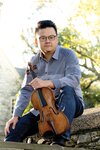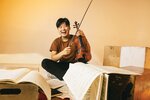



The Concordia Chamber Players’ Feb. 4 concert at Solebury’s Trinity Church, titled “The WolfganG,” presents the brilliant music of Mozart, and that of two 20th-century composers – Martinu and Stravinsky – who were influenced by him.
Mozart’s “Divertimento” in E-flat major provides exactly what it promises: a delightful diversion with six varied and masterfully constructed movements. Of all the works in his chamber music trove, this is Mozart’s first and only string trio. He dedicated it to Michael von Puchberg, a fellow Mason who had made a loan to the impecunious composer. And it was Mozart himself, a violist, who premiered the work during his 1789 five-city tour to Berlin.
Violinist Siwoo Kim hears the lightheartedness in the “Divertimento.” “There’s a section in the theme-and-variations movement where the violin has to play one of the most difficult virtuosic passages I’ve ever played by Mozart. It’s just very fast with ‘noodles’ [of notes], and the violist gets to hold just a few notes. I’m imagining Mozart just laughing while the violinist is struggling through it, he’s enjoying watching him suffer.” Above all, Kim would like for “people to feel invited to listen in on really fun banter among three musicians.”
Just 31 years old, (four years before his death), Mozart had written the “Divertimento” in the same key as his recently composed important symphony #39. The key signature has three flats, with the number three of significance in Freemasonry symbolism.
“If Mozart felt a piece was of some spiritual importance, he used the key of E flat,” notes Kim. This is in keeping with what musicologist Alfred Einstein wrote: “every note is primes inter pares: every note is significant, a contribution to spiritual and sensuous fulfillment in sound—one of his noblest works.”
Since Mozart played the viola (as well as the violin, clavichord, harpsichord, forte-piano, and organ), artistic director Michelle Djokic chose Stravinsky’s “Elegy for Viola,” his only solo work for that instrument, to open the concert. Stravinsky wrote the piece in 1944, on hearing of the death of his friend, violinist Alphonse Onnou, founder of the extant Belgian Pro Arte Quartet.
The Elegy will be performed by Che-Hung Chen, a violist with the Philadelphia Orchestra, who was the first Taiwanese citizen ever to join the orchestra. With his wife, pianist Natalie Zhu, Chen performs with the Clarosa Piano Quartet. In 2019, he founded Quartet Iris with three other Philadelphia Orchestra members. This is his first appearance with the Concordia Chamber Players.
“If I had to take a guess [as to why Stravinsky chose the viola],” says Chen, “it’s the range of the viola’s tones – more mournful, more sorrow-like. Once I started learning it, I was able to, on a personal level, connect with how much sorrow there was in it. Personally, dealing with both of my parents’ passing over the past eight years, it surely brings a feeling of sadness for me when I play it.”
The piece has three sections. Deceptively simple, the middle section is an intricate fugue that explores multiple avenues of grief. When the last section returns with practically the same music as the first, yet in a different key, it serves as a remembrance of a close friend loved and lost.
In 1947, Czech composer Bohuslav Martinu wrote his “Three Madrigals,” dedicating them to the brother-sister duo of violinist Joseph Fuchs and violist Lillian Fuchs, after hearing them perform the Mozart duos. The New York Times critic Howard Taubman reported that the Fuchs premiered the Madrigals Dec. 22, 1947 for the Musicians’ Guild at Times Hall. Subsequently they made a recording of them.
Martinu was also inspired by the choral polyphony – the simultaneous combination of two or more melodic lines – an innovation of 16th-century English madrigals. Taubman noted that “some of his ideas have a folk flavor; one does not know if this was deliberate or accidental.” Hints of Martinu’s Bohemian- Moravian heritage dance through the Madrigals.
Chen feels a special connection with the piece, since his first teacher in Taiwan had been a student of Lillian Fuchs at the Manhattan School of Music. When Chen first played the Madrigals, and every time thereafter, he said, he feels “somehow part of her lineage.”
Like the Elegy, the first and third madrigals bookend the second one, which is Chen’s favorite. “Toward the middle of it there is a chorale, much like a Bach chorale.” However, it is the first and third madrigals that astound: “Every time I play [the piece], the reaction I get from the audience is [that] it’s almost mind-blowing. If they hadn’t heard it before, it really is like nothing else.” What’s like “nothing else” is the rapid-fire volleying, the turbulent tossing of melodic fragments; the duo constantly interrupt or finish each other’s sentences.
You won’t want to miss any opportunity to eavesdrop on such scintillating musical conversations. An open rehearsal will be held at 3:30 p.m. Feb. 3, at Rago Auctions, 333 N. Main St., Lambertville, N.J. The Feb. 4 concert will begin at 3 p.m. at Trinity Church, 6587 Upper York Road, Solebury. Tickets are available at Concordiaplayers.org or at the door.
Join our readers whose generous donations are making it possible for you to read our news coverage. Help keep local journalism alive and our community strong. Donate today.